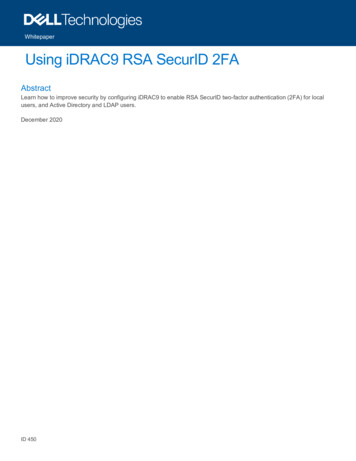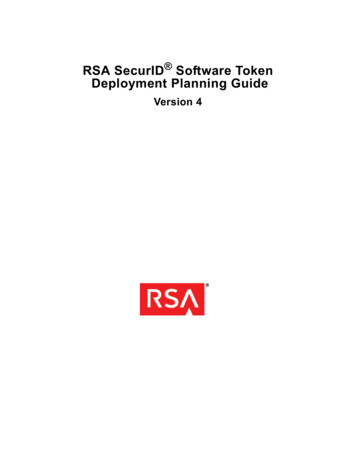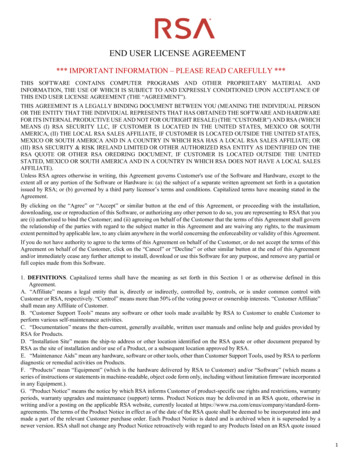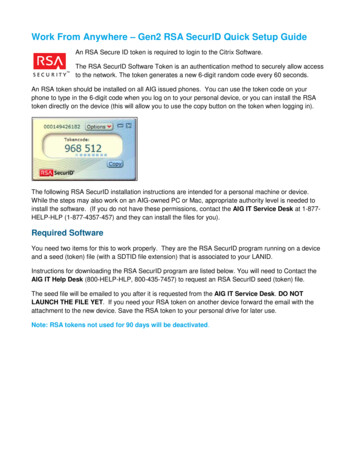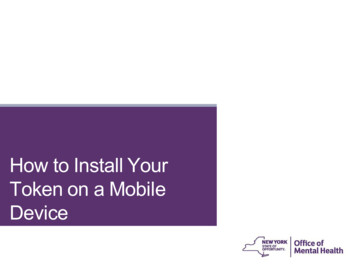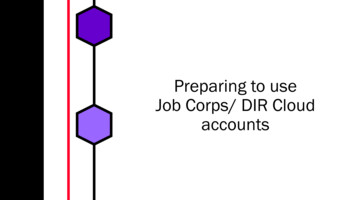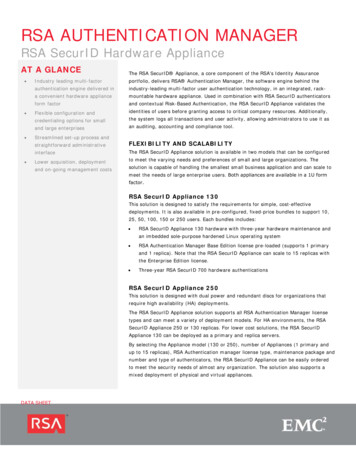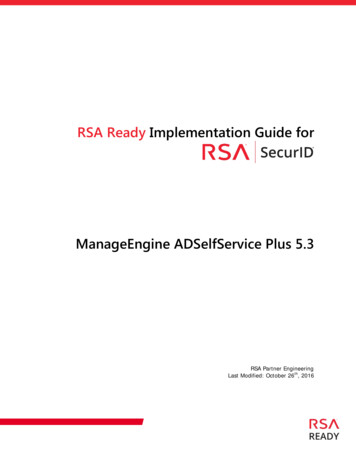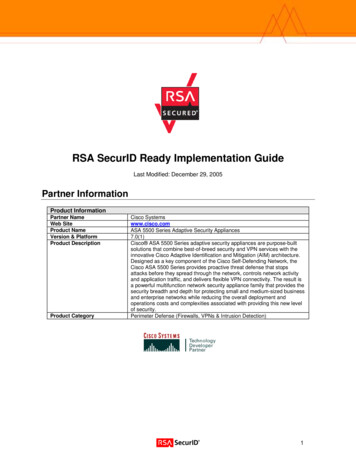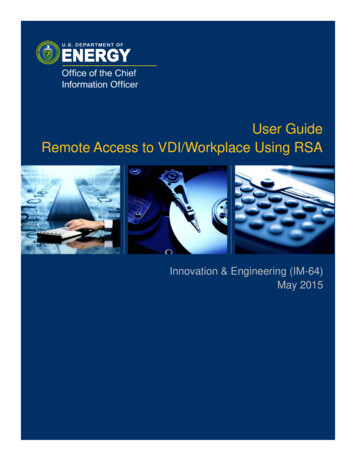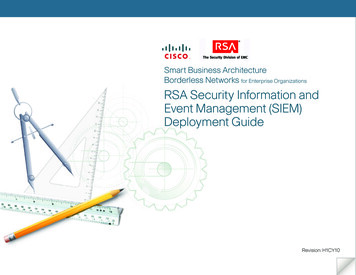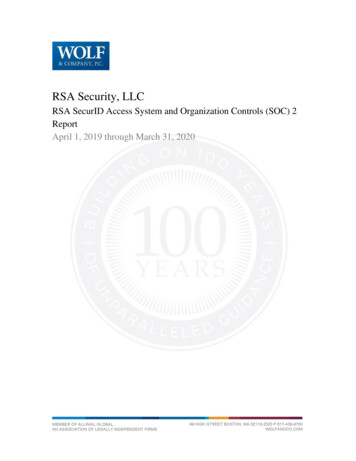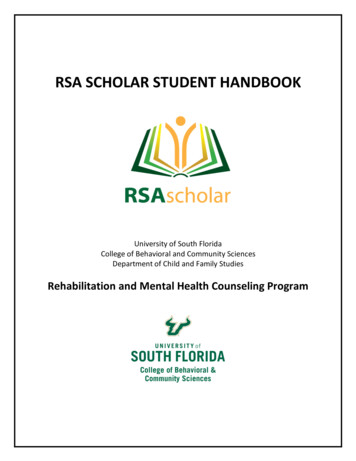
Transcription
RSA SCHOLAR STUDENT HANDBOOKUniversity of South FloridaCollege of Behavioral and Community SciencesDepartment of Child and Family StudiesRehabilitation and Mental Health Counseling Program
TABLE OF CONTENTSINTRODUCTION5BACKGROUND6University of South Florida6College of Behavioral and Community Sciences6Department of Child and Family Studies7Rehabilitation and Mental Health Counseling Program7Mission and Objectives8Rehabilitation Counselor Scope of Practice9Assumptions9Underlying Values9Scope of Practice Statement10RMHC Accreditation11CACREP11CORE/CACREP Merger12RSA SCHOLARSHIP INFORMATION12Overview12Purpose13Primary Aims13Rehabilitation Services Administration13Admission Criteria14RMHC Program14RSA Scholar Program15RSA Application Submission Instructions16Revised: 17-Nov-202
Scholar Selection17Notice of Nondiscrimination17Scholars Progress and Academic Standing18GPA Requirements and Probation18Academic Performance19Academic Policies and Regulations19Advising and Professional Organizations19RSA Scholar Advising19Professional Organizations20Scholarships and Financial Procedures20Scholar Payback Agreement21RSA SCHOLAR PAYBACK REQUIREMENTS21VR Internship21Employment Obligation22PIMS System During Payback Period22Deferral/Repayment Exceptions23Failure to Meet Obligation24RSA SCHOLAR CURRICULUM25Course Sequencing25New Courses for RSA Scholars27Advanced Case Management and Quality Documentation27Critical Thinking Skills and Collaborative Relationships27Advanced Rehabilitation Systems and Services28Program ElectivesRevised: 17-Nov-20283
CRC Exam Preparation Course29Field Experience/Internship29Final Comprehensive Examination30CERTIFIED REHABILITATION COUNSELOR (CRC) CREDENTIAL30Benefits of Certification31Code of Ethics for CRCs31REFERENCES32APPENDICESAppendix A: Scholar Agreement33Appendix B: Faculty Credentials and Contact Information36Appendix C:38Professional Organizations and ResourcesAppendix D: Frequently Asked QuestionsRevised: 17-Nov-20394
INTRODUCTIONCongratulations! You are about to embark on a rewarding journey as an RSA Scholar. Thepurpose of the RSA Scholar program is to promote the recruitment, training and development ofhighly qualified rehabilitation counselors to meet the high demand for providers of vocationalrehabilitation (VR) services for individuals with disabilities. The focus of the project is to integratecustomized employment practices into the core curriculum in alignment with new legislation thatrequires public VR systems to add customized employment options to their menu of services.Scholars agree to work (for full pay and an excellent benefit package) in the public or private VRsystem after graduation for a designated period of time (typically 2-4 years) in exchange fortuition and other qualifying expenses.Rehabilitation counselors are the only professional counselors educated and trained atthe graduate level specifically to serve individuals with disabilities. This includes an extensiveknowledge of all aspects of disability as well as an in-depth understanding of criticalconsiderations such as assistive technology and employment law. Unlike other counselingprofessionals, rehabilitation counselors are uniquely qualified to help individuals with disabilitiesacclimate into the workplace, and to help employers make a workplace more receptive toindividuals with disabilities (CRCC, 2015).Better Pay. Better Benefits.In 2014, the American Counseling Association (ACA) completed the first ever CounselorCompensation Study. Rehabilitation counselors came out on top (ACA, 2014). Better Pay – Rehabilitation counselors are the most highly paid counseling specialty onaverage and earn over 13,000 more than Clinical Mental Health Counselors, MentalHealth Counselors, or Community Counselors. Better Benefits – Rehabilitation counselors receive better benefits than otherprofessional counselors. These include employee retirement plans, medical coverage,dental, vision, and short-term and long-term disability.Revised: 17-Nov-205
This handbook will assist RSA scholars on their educational journey. It provides informationon all aspects of the scholarship including payback requirements. Frequently asked questions areincluded as a supplement to the personal advising that each scholar will receive from an assignedRSA program faculty member. Enjoy your journey!IMPORTANT NOTE: This handbook provides information specific to the RSA scholarship grantprogram. Full RMHC program information and requirements are included in the RMHC StudentHandbook that can be found on the program website.BACKGROUNDUniversity of South FloridaThe University of South Florida is a high-impact, global research university located inTampa, Florida. It is one of the largest public universities in the nation, and among the top 25universities, public or private, for federal research expenditures. The university is one of only fourFlorida public universities classified by the Carnegie Foundation for the Advancement of Teachingin the top tier of research universities, a distinction attained by only 2.3 percent of all universities.At the heart of USF is a vibrant, diverse and engaged student body. Serving more than 50,000students, the USF System has an annual budget of 1.8 billion and an annual economic impact of 4.4 billion.College of Behavioral and Community ScienceEstablished in 2008, the College of Behavioral & Community Sciences combinesknowledge gained through the behavioral sciences with knowledge from the community. Theemphasis on behavioral science reflects a focus on individuals, with behavioral research thatexamines problems and challenges people encounter, as well as their need for clinical andsupportive services. The emphasis on community science reflects commitment to understandingthe larger contextual factors that have an impact on the well-being and safety of individuals andtheir families, such as the effectiveness of systems and policies that impact and support the wellbeing of individuals. This is accomplished by engaging community and neighborhoodRevised: 17-Nov-206
stakeholders in a partnered, participatory manner and by collaborating with local, state, andnational organizations in both the public and private sectors.The College of Behavioral & Community Sciences serves more than 3,000 students witheight undergraduate, eight masters, and six doctoral programs housed in six academicdepartments/schools. The College is the home of the Louis de la Parte Florida Mental HealthInstitute, one of the largest behavioral health research and training institutes in the country aswell as 17 specialized Research Centers and Institutes. CBCS’s aim is to be among the mostinfluential resources for behavioral and community sciences in the region, nation, and world.Department of Child and Family StudiesThe Department of Child & Family Studies (CFS) is one of seven departments and schoolswithin the College of Behavioral & Community Sciences (BCS) at the University of South Florida(USF), and historically affiliated with the Louis de la Parte Florida Mental Health Institute (FMHI).All activities within CFS are closely aligned with USF strategic goals to expand research andscholarly endeavors, expand initiatives to strengthen and sustain healthy communities and toimprove the quality of life for children and families. Academic programs are aligned with theUniversity's goal of creating and supporting programs that address the changing needs of theregion, state and nation through innovative approaches to curriculum development and delivery.CFS is consistently among the top three University departments bringing in external funding, thusmeeting the University goal of establishing a strong and sustainable economic base in support ofUSF's growth.Rehabilitation and Mental Health Counseling ProgramThe Rehabilitation and Mental Health Counseling (RMHC) program promotes qualityservices for individuals with differences in abilities and helps the state meet its human serviceneeds in the areas of rehabilitation and mental health through teaching, research and service.The Master's Program offers both a non-thesis and a thesis program. Three graduate certificatesare also offered. Rehabilitation and Mental Health Counseling is an interdisciplinary field and, assuch, draws from many related areas. For example, included in this interdisciplinary program isRevised: 17-Nov-207
information drawn from psychology, education, behavioral sciences, biological sciences,philosophy, engineering, and law.U.S. News & World Report's "America's Best Graduate Schools" rankings released in March2019 listed RMHC at 27th in the nation, out of the 166 Rehabilitation Counseling GraduatePrograms in the United States.RMHC program faculty has expertise and credentialing in many areas of rehabilitationcounseling including vocational evaluation, customized employment strategies, careercounseling, assessment, and assistive technology. The program has been training highly qualifiedrehabilitation counselors for decades, hundreds of which have become employed by VR, and iswell positioned to address the shortage of rehabilitation professionals through provision of itsproven rehabilitation master’s degree program.Mission and ObjectivesThe mission of Rehabilitation and Mental Health Counseling is to promote qualitybehavioral health care for all, particularly people with disabilities, and to help the state andnation meet their human service and workforce needs in the area of rehabilitation and mentalhealth counseling through teaching, research and service.The objectives of the program are to:1. Recruit and graduate a highly qualified and diverse student body from local, state,national and international regions.2. Provide high quality teaching and inspire learning in rehabilitation and mental healthcounseling and related disciplines.3. Contribute to and broaden research in the field of rehabilitation and mental healthcounseling and related disciplines through local, national and global collaboration.4. Prepare rehabilitation and mental health counselors to be critical consumers ofinformation and to encourage participation in and contribution to the expansion ofknowledge in the field of rehabilitation and mental health counseling.5. Enhance and maintain community engagement and service for the professionaldevelopment of students by expanding experiential (field) training experiences.Revised: 17-Nov-208
6. Maintain and improve the ranking in U.S. News & World Report's America's Best GraduateSchools.7. Maintain CORE and CACREP Accreditation at the highest levels of eligibility.8. Increase the number of students who earn credentials as licensed and certifiedprofessionals.Rehabilitation Counselor Scope of PracticeThe Scope of Practice Statement identifies the knowledge and skills required for effectiverehabilitation counseling services.Assumptions: The Scope of Practice Statement identifies knowledge and skills required for the provisionof effective rehabilitation counseling services to persons with physical, mental,developmental, cognitive, and emotional disabilities as embodied in the standards of theprofession's credentialing organizations. Several rehabilitation disciplines and related processes (e.g., vocational evaluation, jobdevelopment and job placement, work adjustment, case management) are tied to thecentral field of rehabilitation counseling. The field of rehabilitation counseling is aspecialty within the rehabilitation profession with counseling at its core and isdifferentiated from other related counseling fields. The professional scope of rehabilitation counseling practice is also differentiated from anindividual scope of practice, which may overlap, but is more specialized than theprofessional scope. An individual scope of practice is based on one's own knowledge ofthe abilities and skills that have been gained through a program of education andprofessional experience. A person is ethically bound to limit his/her practice to thatindividual scope of practice.Underlying Values: Facilitation of independence, integration, and inclusion of people with disabilities inemployment and the community. Belief in the dignity and worth of all people. Commitment to a sense of equal justice based on a model of accommodation to provideand equalize the opportunities to participate in all rights and privileges available to allRevised: 17-Nov-209
people; and a commitment to supporting persons with disabilities in advocacy activitiesto achieve this status and empower themselves. Emphasis on the holistic nature of human function which is procedurally facilitated by theutilization of such techniques as:ointerdisciplinary teamwork;ocounseling to assist in maintaining a holistic perspective;oa commitment to considering individuals within the context of their familysystems and communities. Recognition of the importance of focusing on the assets of the person. Commitment to models of service delivery that emphasize integrated, comprehensiveservices which are mutually planned by the consumer and the rehabilitation counselor.Scope of Practice Statement:Rehabilitation counseling is a systematic process which assists persons with physical, mental,developmental, cognitive, and emotional disabilities to achieve their personal, career, andindependent living goals in the most integrated setting possible through the application of thecounseling process. The counseling process involves communication, goal setting, and beneficialgrowth or change through self-advocacy, psychological, vocational, social, and behavioralinterventions. The specific techniques and modalities utilized within this rehabilitation counselingprocess may include, but are not limited to: assessment and appraisal; diagnosis and treatment planning; career (vocational) counseling; individual and group counseling treatment interventions focused on facilitatingadjustments to the medical and psychosocial impact of disability; case management, referral, and service coordination; program evaluation and research; interventions to remove environmental, employment, and attitudinal barriers; consultation services among multiple parties and regulatory systems;Revised: 17-Nov-2010
job analysis, job development, and placement services, including assistance withemployment and job accommodations; and provision of consultation about and access to rehabilitation technology.RMHC ACCREDITATIONThe Rehabilitation and Mental Health Counseling Program at the University of SouthFlorida is fully accredited by the Council for Accreditation of Counseling and Related EducationPrograms (CACREP) through 2023. The goal of accreditation is to ensure that education providedby programs and institutions of higher education meets acceptable levels of quality.CACREPThe CACREP Standards are organized into six sections which include:(1) The Learning Environment includes standards pertaining to the institution, theacademic unit, and program faculty and staff.(2) Professional Counseling Identity, includes foundational standards and the counselingcurriculum, comprising the eight required core content areas.(3) Professional Practice refers to standards required for entry-level practice, practicum,internship, supervisor qualifications, and practicum and internship course loads.(4) Evaluation in the Program provides standards relevant to evaluation of the program,assessment of students, and evaluation of faculty and site supervisors.(5) Entry-Level Specialty Areas provides standards relevant to specialty areas offered bythe program. These include addictions; career; clinical mental health; clinical rehabilitation;college counseling and student affairs; marriage, couple, and family; school counseling; andrehabilitation counseling. For each specialty area, standards pertaining to foundations,contextual dimensions and practice are provided.(6) Doctoral Standards for Counselor Education and Supervision, including learningenvironment, professional identity, and doctoral-level practicum and internship requirements.(CACREP Standards Document: 016Standards-with-Glossary-5.3.2018.pdf)Revised: 17-Nov-2011
CORE/CACREP MergerOn July 20, 2015, the counseling profession’s two major accrediting organizations – theCouncil on Rehabilitation Education (CORE) and the Council for Accreditation of Counseling andRelated Educational Programs (CACREP) – signed a Plan of Merger Agreement. The Plan,approved by both the CORE Board and CACREP Board at their respective summer meetings,represents several years of discussions on strengthening the counseling profession through theestablishment of a single unified accreditation process for counselor preparation programs. COREand CACREP had entered into an historic affiliation agreement in 2013 to accomplish this onbehalf of all future counselors and their clients. The two organizations believe their vision for aunified counseling profession is better realized through a merger of both organizations. COREand CACREP will immediately begin taking steps toward implementing the terms of the mergeragreement, which will be concluded effective June 30, 2017. Beginning July 1, 2017, CACREPcarried on the mission of both organizations. In the interim, CORE will continue to conduct thebusiness of accreditation on behalf of its programs and will complete its current standardsrevision process for rehabilitation counseling programs. CACREP and CORE jointly appointed acommittee to examine the reformatting of CORE Standards to fit into the CACREP reviewstructure, as well as to recommend how disability concepts can be more fully and clearly infusedinto the CACREP Standards to strengthen the future preparation of all counselors.(Excerpt from CACREP policy document: nversion-Policy-of-RC-to-ClRC-and-CMHC.pdf).RSA SCHOLARSHIP INFORMATIONOverviewThe RMHC program has been awarded a five-year, renewable federal long-term traininggrant to increase the number of highly qualified rehabilitation counselors available to work withinthe vocational rehabilitation system. This grant provides scholarship opportunities for studentsbeginning in 2016. Scholars will agree to work (for full pay and benefit) in the public, non-profit,or private vocational rehabilitation system after graduation for a designated period of time(typically 2-4 years) in exchange for tuition and other qualifying expenses. Scholarships are madeavailable through a federal grant from Rehabilitation Services Administration (RSA), United StatesRevised: 17-Nov-2012
Department of Education. In keeping with the priorities established by the Rehabilitation ServicesAdministration, the USF Rehabilitation and Mental Health Counseling (RMHC) graduate programis designed to provide the student competencies in the rehabilitation of adults with complexphysical, mental or emotional disabilities and to provide a special relevance to state vocationalrehabilitation services and closely related cooperating private agencies and programs.PurposeThe major purpose of the RSA academic scholarship award is to recruit and sponsorexceptional graduate students who, through the program, will be trained to become highlyqualified rehabilitation counselors who are uniquely prepared to respond to personnel shortageswithin the public vocational rehabilitation(VR)system. The focus of the project is to increase theskills of rehabilitation counseling scholars so that, upon successful completion of the RMHCprogram, they are prepared to effectively meet the needs and demands of consumers withdisabilities and employers.Primary AimsAim 1: Recruit a minimum of 25 scholars (5 annually), with outreach to underserved groups*, toincrease the number of competent rehabilitation professionals available to work in the VRsystem.Aim 2: Provide high quality training based on the recommendations of researchers and effectivepractices in the field to promote competitive, integrated employment outcomes for VRconsumers.Aim 3: Provide targeted training on CE strategies designed to identify the interests and talents ofjob seekers and to negotiate career placements in competitive, integrated settings.Aim 4: Enhance collaborative relationships with VR, community-based providers, employers, andother stakeholders to promote a more efficient, effective, and seamless system.*The applicant understands that it is permissible to conduct outreach to increase eligible minoritycandidates, but not to admit or provide funding solely on the basis of race, ethnicity, or disability.Rehabilitation Services AdministrationRevised: 17-Nov-2013
The Rehabilitation Services Administration (RSA) is the funder for the RSA Scholarprogram. RSA oversees grant programs that help individuals with physical or mental disabilitiesto obtain employment and live more independently through the provision of such supports ascounseling, medical and psychological services, job training and other individualized services.toprovide leadership and resources to assist state and other agencies in providing vocationalrehabilitation (VR) and other services to individuals with disabilities to maximize theiremployment, independence and integration into the community and the competitive labormarket.RSA is charged with: administering formula and discretionary grant programs authorized by Congress; evaluating, monitoring, and reporting on the implementation of Federal policy andprograms and the effectiveness of vocational rehabilitation, supported employment, andother related programs for individuals with disabilities; coordinating with other Federal agencies, State agencies, and the private sector includingprofessional organizations, service providers, and organizations of persons withdisabilities for the review of program planning, implementation, and monitoring issues.Admission CriteriaAdmission to RMHC ProgramApplicants to the RSA Scholar program must first be admitted to the Rehabilitation andMental Health Counseling graduate program. Students are admitted for Fall semester only. Theapplication deadline is January 15th for Fall semester. International students please refer to theInternational Admissions-Office of Admissions website page for all international deadlines.Applicants must complete the following steps:1. Submit an online graduate application indicating Rehabilitation Counseling as theselected major.Link to RMHC application: sprogram/admissions.aspxRevised: 17-Nov-2014
2. Submit all required documents to the Office of Graduate Admissions which will include 3Letters of Recommendation, current resume, official GRE scores, and statement ofpurpose. Specific details regarding document requirements are listed on the application.3. Pay the 30 application fee as required by the application.Please note: Applicants are expected to have earned a grade point average (GPA) of 3.0 or higheron all course work beyond 60 credit hours at the bachelor's degree level from a regionallyaccredited institution or the equivalent from a foreign institution. Enrollment is limited andapplications are judged competitively. Meeting minimum admission standards does notguarantee acceptance into the program. Students typically enter the Program after earning abachelor's degree in a social, behavioral or health sciences related disciplines, but no specificundergraduate major is required.Admission to RSA Scholar ProgramRSA Scholarships are available to graduate students accepted to or enrolled in the RMHCmaster’s degree program. Awards are based upon an appropriate match of a person's careerobjectives in relation to the purpose of the scholarship program. Potential for graduate work asindicated by educational background, work experience, and financial need is also considered inselecting scholarship recipients.Persons receiving a scholarship must: document United States residency or citizenship status; state an interest in a career in the vocational rehabilitation of individuals with disabilities; agree to the requirement to complete an internship in an approved VocationalRehabilitation agency; agree to the employment obligation described in this summary; not be concurrently receiving any other federal, state or local public or voluntary agencyeducational allowance when that allowance is conditional on a conflicting employmentobligation;Revised: 17-Nov-2015
not be in default on a debt to the federal government under a non-procurementtransaction; not be declared by a judge (under the Anti-Drug Abuse Act of 1988) ineligible to receivefederal assistance; be a full-time graduate student in the RMHC program; maintain a grade point average of 3.0 or above; maintain satisfactory progress toward completing the degree requirements; and meet program matriculation and retention policies.A scholarship recipient must be enrolled as a full-time (or equivalent) student. Exceptionsfor part-time status may be made with the approval of the RSA Program Director. The normallength of time for which the RSA Scholarships is awarded is 2.5 years (where nine credits persemester is considered full-time). All awards are contingent upon receipt of an annual award ofan RSA Long-Term Training Grant. Award levels for individual RSA Scholarships are dependent onthe number of qualified applicants, the need demonstrated by these applicants, and the level offunding. Because of an extensive number of qualified applicants and limited financial support,partial scholarships may be awarded at times.Application Submission Instructions:1. Complete RSA Scholar Application*2. Attach Current Resume3. Attach Statement of Interest – Describe your career goal and interests and relate them tothe purpose of the RSA scholarship (no more than 1 double-spaced page).4. Submit application materials to the RSA Program Director c/o: Dr. Christina DillahuntAspillaga at cdillahuntas@usf.edu. Email submissions should contain “RSA ScholarApplication” in the subject line. Faxed applications may be submitted to 813-974-8080.* The RSA Scholar application is only for the RSA Scholar program. Acceptance to theRehabilitation and Mental Health Counseling Program at the University of South Florida isrequired prior to admission to the RSA Scholar program.Revised: 17-Nov-2016
If you are a person with a disability and need accommodations for completing the applicationprocess including alternative formats, please contact the RMHC Program at 813-974-2855 oryou may contact the RSA Program Director directly at cdillahuntas@usf.edu.Scholar SelectionAll RSA Scholar applications that 1) are complete; and 2) are submitted by the publisheddeadline will be reviewed by a committee of two or more reviewers. Reviewers may berecruited from the RMHC faculty and the RSA Scholar Program Advisory Committee.Applications are independently scored on multiple criteria using a 5-point scale. Criteria includestudent status in the RMHC program; grade point average (last 60 credit hours); relevantexperience (paid and unpaid); career interest and goals; quality of the statement of interest;and quality/completeness of the application. The number and amount of scholarship awardswill be contingent upon the amount of funding available, number of qualified applicants,financial need of the applicants and, when appropriate, other factors based on the judgementof the reviewers.NOTE: Recruitment strategies will target underserved populations. It is permissible to conductoutreach to increase eligible minority candidates, but not to admit or provide funding solely onthe basis of race, ethnicity, or disability. Therefore, these criteria will not be used in scoring orprioritizing applications.Notice of NondiscriminationThe Rehabilitation and Mental Health Counseling Program demonstrates respect for andunderstanding of cultural and individual diversity and avoids any actions that would restrictprogram access or completion on grounds that are irrelevant to success in graduate training.Pursuant to Title IX, the University does not discriminate on the basis of sex in educationalprograms or activities that it operates. Such protection extends to both employees and students.Any questions or inquiries concerning to the application of Title IX may be referred to the Title IXCoordinator, Senior Deputy Title IX Coordinator, or to any of the University's Deputy Title IXCoordinators. The most up-to-date information on the University's Title IX Coordinator andresources can be found in the webpage for the Office of Diversity, Inclusion and EqualRevised: 17-Nov-2017
Opportunity, located at http://www.usf.edu/diversity. When appropriate, the University willtake steps to prevent the recurrence of harassment, including sexual violence, and to correct anydiscriminatory effects of harassment on the complainant and others.The Title IX Coordinator is:Araina Muniz4202 E. Fowler Avenue, ALN 172, Tampa, Florida 33620(813) 974-4373; arainamuniz@usf.eduDiscrimination and harassment on the basis of race, color, marital status, sex, religion, nationalorigin, disability, age, genetic information, gender identity and expression, sexual orientation, orveteran status are also prohibited. (Please see USF System Policy Number 0-007, Diversity &Equal Opportunity: Discrimination & Harassment).Scholars Progress and Academic StandingRSA scholars are required to meet the same criteria for academic progress and standingas are indicated for all RMHC students. Specific information, policies, and procedures areincluded in the RMHC Student Handbook, the USF website, and in RMHC course syllabi. Studentsare responsible for familiarizing themselves with this information and for maintaining the highestlevel of ethical and professional behavior in the classroom and in the field.GPA Requirements and ProbationAll graduate students are required to maintain a minimum 3.0 GPA and earn a “B” orbetter in each graduate course. A GPA
Handbook that can be found on the program website. BACKGROUND University of South Florida The University of South Florida is a high-impact, global research university located in Tampa, Florida. It is one of the largest public universities in the nation, and among the top 25 universities, public or private, for federal research expenditures.
